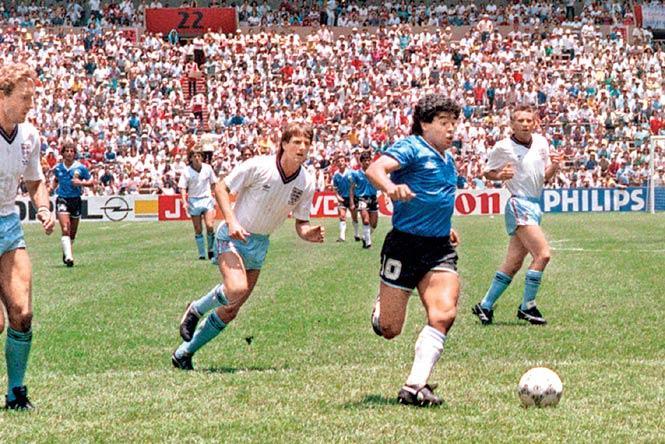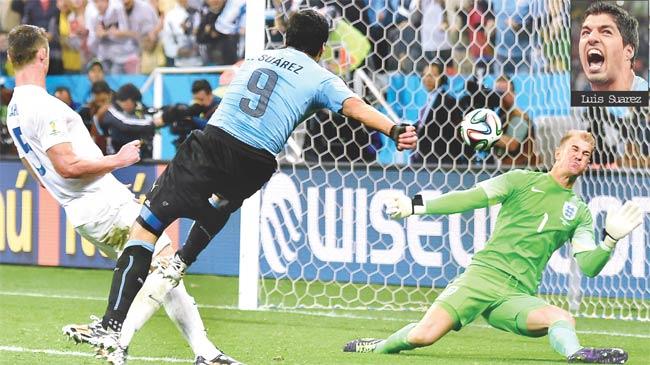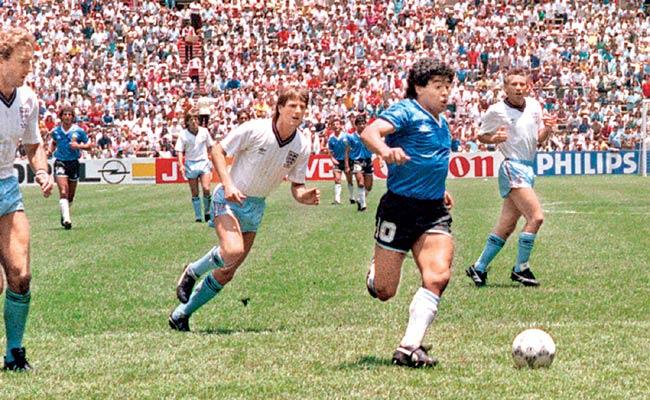Luis Suarez's desperation on the football pitch is similar to the Argentina legend, who appeared to play every minute of every game as though it would be his last

Diego Maradona (in blue) runs past Terry Butcher (left) and Terry Fenwick (second from left) on his way to scoring a goal during the 1986 World Cup quarter-final tie against England in Mexico
You can see it every time you watch snippets from the 1986 World Cup. One man against the world. Every touch that he took, every pass he made, every tackle he hurdled, every malevolent foot that sent him tumbling to the turf, every joyous goal celebration. Diego Maradona's face, never less than expressive, was a barometer for Argentina's fortunes.
Uruguay's forward Luis Suarez (in blue) scores a goal against England in Sao Paulo on Thursday. Pics/AFP
ADVERTISEMENT
The agony of the South Korea game, when the opposition tactics seemed to consist of little more than kicking lumps out of him, the ecstasy after the second goal against England, and the tears minutes after a perfectly weighted pass to Jorge Burruchaga had resulted in the decisive goal in the final.
Desperate
Maradona appeared to play every minute of every game as though it would be his last. He was conductor and virtuoso, master and slave, playmaker and water carrier. As much as the skill, beyond all but a handful of players in the game's history, what underpinned his efforts in Mexico that summer was desperation. The desperation of the hunted, of the man who feared that everything he loved or cherished would be taken away from him.
You can see that desperation each time Luis Suarez takes the football pitch. Whether it's playing Norwich on a winter afternoon in East Anglia or going head-to-head against England in a World Cup game watched by millions, Suarez's approach never changes. With him, there are never any half measures. It didn't matter that he was coming back from knee surgery, or that he hadn't seen any competitive action for more than a month.
When the moments came, Suarez was there, perfectly placed to steer a textbook header past Joe Hart and then to seize on the English defence parting like the Red Sea in the final minutes. In Maradona's case, the desperation had everything to do with the previous two World Cups.
Diego Maradona (in blue) runs past Terry Butcher (left) and Terry Fenwick (second from left) on his way to scoring a goal during the 1986 World Cup quarter-final tie against England in Mexico
In 1978, Cesar Luis Menotti had thought him too young to take a chance on. As it turned out, Argentina didn't need him. But four years later, established as the creative hub of the team, Maradona endured a miserable competition, one that culminated in a red card against Brazil, a match in which Argentina were played off the park by one of the greatest teams ever.
In Mexico, even with a reduced support cast around him, he needed to prove that he could deliver on the biggest stage. Before him, several of those lauded as the best in the world had fallen short in the games that mattered. Matthias Sindelar could only take Austria's Wunderteam as far as the World Cup semi-final in 1934.
A generation later, West Germany upset Ferenc Puskas – clearly suffering the effects of a bad tackle earlier in the tournament – and his Magic Magyars in the final. And it was the Germans again that ensured Johan Cruyff would never have a World Cup win on an otherwise incredible resume.
Hodgson's challenge
Before the England-Uruguay game, Roy Hodgson, who was sacked as Liverpool manager just weeks before Suarez arrived at Anfield, reckoned that Suarez needed a dominant World Cup display to be accepted as one of the greats of the game.
He may have had a point, but for a man who has thrived on proving people wrong all his life, it was just the spur needed to summon up a defining performance. Uruguay had to be content with scraps of possession, with Suarez a peripheral figure for the most part. But two goals from the two chances that came his way tell their own story.
Similar efforts needed
The loss to Costa Rica, characterised by some shockingly poor defending, has left Uruguay teetering on the edge though. A draw will be enough for Italy to progress. For Suarez and his mates, nothing less than three points will do.
And for all the tenacity that Diego Godin provides in defence and the selfless running that Edinson Cavani is famed for, it is Suarez that will be the key man. In the eyes of those that follow the game only casually, the notorious handball against Ghana at the last World Cup and two acts of borderline cannibalism — not to mention alleged racist abuse — continue to define Suarez the footballer.
Yet, this is a man of prodigious gifts, who plays with an intensity that most can't even fathom. A lifetime after Alcides Ghiggia and Juan Schiaffino scripted the greatest chapter in a tiny nation's football history, upsetting Brazil in the 1950 final, the man they call El Pistolero could yet make the tournament his own.
Dileep Premachandran is Wisden India’s editor-in-chief
 Subscribe today by clicking the link and stay updated with the latest news!" Click here!
Subscribe today by clicking the link and stay updated with the latest news!" Click here!







